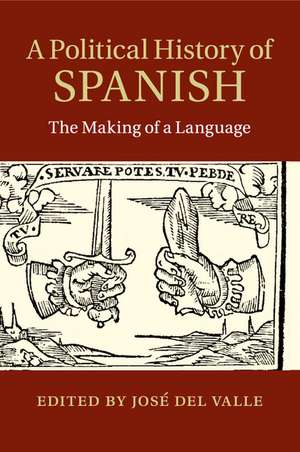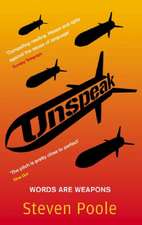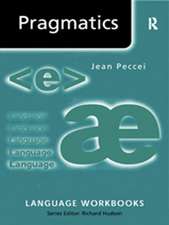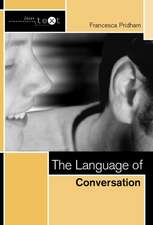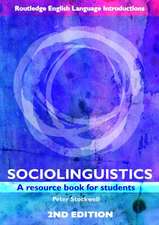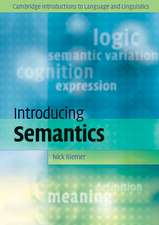A Political History of Spanish: The Making of a Language
Editat de José Del Valleen Limba Engleză Paperback – 5 aug 2015
| Toate formatele și edițiile | Preț | Express |
|---|---|---|
| Paperback (1) | 290.29 lei 6-8 săpt. | |
| Cambridge University Press – 5 aug 2015 | 290.29 lei 6-8 săpt. | |
| Hardback (1) | 788.63 lei 6-8 săpt. | |
| Cambridge University Press – 28 aug 2013 | 788.63 lei 6-8 săpt. |
Preț: 290.29 lei
Nou
Puncte Express: 435
Preț estimativ în valută:
55.54€ • 57.100$ • 45.87£
55.54€ • 57.100$ • 45.87£
Carte tipărită la comandă
Livrare economică 15-29 aprilie
Preluare comenzi: 021 569.72.76
Specificații
ISBN-13: 9781107533653
ISBN-10: 1107533651
Pagini: 446
Ilustrații: 2 b/w illus. 4 tables
Dimensiuni: 153 x 230 x 25 mm
Greutate: 0.59 kg
Editura: Cambridge University Press
Colecția Cambridge University Press
Locul publicării:New York, United States
ISBN-10: 1107533651
Pagini: 446
Ilustrații: 2 b/w illus. 4 tables
Dimensiuni: 153 x 230 x 25 mm
Greutate: 0.59 kg
Editura: Cambridge University Press
Colecția Cambridge University Press
Locul publicării:New York, United States
Cuprins
Part I. Theoretical Underpinnings: 1. Language, politics and history: an introductory essay José del Valle; Part II. The Making of Spanish: Iberian Perspectives: 2. Introduction Alberto Medina, Henrique Monteagudo and José del Valle; 3. The prehistory of written Spanish and the thirteenth-century nationalist zeitgeist Roger Wright; 4. Language, nation and empire in early modern Iberia Miguel Martínez; 5. The seventeenth-century debate over the origins of Spanish: links of language ideology to the morisco question Kathryn Woolard; 6. The institutionalization of language in eighteenth-century Spain Alberto Medina; 7. The officialization of Spanish in mid-nineteenth-century Spain: the Academy's authority Laura Villa; 8. Spanish and other languages of Spain in the Second Republic Henrique Monteagudo; Part III. The Making of Spanish: Latin American and Transatlantic Perspectives: 9. Introduction Elvira Narvaja de Arnoux and José del Valle; 10. Language, religion and unification in early colonial Peru Paul Firbas; 11. Grammar and the state in the Southern Cone in the nineteenth century Elvira Narvaja de Arnoux; 12. The politics of lexicography in the Mexican Academy in the late nineteenth century Bárbara Cifuentes; 13. Language in the Dominican Republic: between Hispanism and Panamericanism Juan Valdez; 14. Language diversity and national unity in the history of Uruguay Graciela Barrios; 15. Language debates and the institutionalization of philology in Argentina in the first half of the twentieth century Guillermo Toscano y García; 16. Linguistic emancipation and the academies of the Spanish language in the twentieth century: the 1951 turning point José del Valle; Part IV. The Making of Spanish: US Perspectives: 17. Introduction José del Valle and Ofelia García; 18. Language, church and state in territorial Arizona Elise M. DuBord; 19. The politics of Spanish and English in territorial New Mexico Arturo Fernández Gibert; 20. Public health and the politics of language in early twentieth-century Texas Glenn Martínez; 21. Categorizing Latinos in the history of the US Census: the official racialization of Spanish Jennifer Leeman; Part V. The Making of Spanish Beyond Spain and the Americas: 22. Introduction Mauro Fernández and José del Valle; 23. The status of Judeo-Spanish in the Ottoman Empire Yvette Bürki; 24. Language and the Hispanization of Equatorial Guinea Susana Castillo Rodríguez; 25. The representation of Spanish in the Philippine Islands Mauro Fernández.
Recenzii
'With more than 400 million speakers spread over every continent, the Spanish language represents a powerful social and political force in the modern world. A political history of Spanish traces the development of Spanish from a rustic regional vernacular to a multi-center world powerhouse, including the rise of Castilian as the variety of choice and the institutional control of the Royal Academy. The coverage includes Spain, Spanish America, the United States, Africa, and Asia. This skilfully configured anthology provides a valuable complement to linguistic histories of Spanish, by documenting the socio-political currents that shaped one of the world's most prominent languages. Historians, linguists, political scientists, and students of language and culture will find relevant and thought-provoking material in these essays.' John Lipski, Edwin Erle Sparks Professor of Spanish and Linguistics, Pennsylvania State University
Descriere
A comprehensive work which offers a new and provocative approach to Spanish from political and historical perspectives.
